Atlas of Chinese Blockchain Listed Companies (2019)
Author: Lin Zeling
This report was jointly released by Null One Think Tank & Digital Asset Research Institute.
The development of 215 concept stocks' blockchain business is different. Nearly 30 companies have publicly stated that they have not actually launched business. At least 30 companies have launched blockchains through investment, holding, participation in shares or setting up subsidiaries in blockchain companies. Business and other methods are related to the concept of blockchain.
Wangxin Office published two batches of 506 blockchain information service filing numbers, involving 414 enterprises and 42 associated listed companies. The three traditional Internet giants of BAT and the two major e-commerce providers of JD.com and Suning have the corresponding blockchain filing information. Representative companies in the fields of education, home appliances, logistics, and biomedicine are also listed. Among them, China Ping An's associated blockchain has the largest number of record information, reaching 10.
- Observation | The Last Public Chain: Who is the Last King?
- Discussion: The Future of Open Finance, Public Chain and Alliance Chain
- A man who knows cryptocurrencies better than Xiaozha forms the Blue Sky team and wants to "rule" decentralized social media standards
In the past few years, there has been constant noise around the blockchain and digital currency industries, but the role of blockchain technology in promoting the digital transformation and upgrading of the physical industry has been explored and recognized by more and more companies, and it has also been the highest in the country. Layer of affirmation. Driven by market, policy and other factors, many companies are actively deploying blockchain business. Among them, the listed company group has become more active in developing blockchain-related businesses by virtue of its capital and technology reserve advantages. The layout in the blockchain field can also better reflect the relatively advanced development of the industry.
This report will focus on the concept of blockchain companies in the A-share market. It analyzes the basic situation of concept stocks and the distribution of blockchain business involved, and promotes the progress of China's listed enterprise groups in the development and application of blockchain technology. Make a panoramic observation with a view to seeing the development status and trends of China's blockchain industry.
Integrating Oriental Fortune Choice, blockchain concept stocks on the wind platform (as of October 31), and listed companies involved in the first and second batches of blockchain enterprise filing information of the Netcom office cloth, Zero One Think Tank has a total of 215 Only A-share blockchain concept stocks are used as research objects. They either carry out their own blockchain business, or they are related to the blockchain concept through investment, equity participation and business development by subsidiaries.
First, the basic situation of 215 concept stocks
(I) Listed companies in Beijing, Shanghai, Shenzhen and Hangzhou are active
The 215 blockchain concept stocks delineated in this article are distributed in the four listed sections of the A-share market, including 27 main boards of the Shenzhen Stock Exchange, 65 small and medium-sized boards of the Shenzhen Stock Exchange, 79 GEM of the Shenzhen Stock Exchange, and 44 main boards of the Shanghai Stock Exchange.

Figure 1: Distribution of 215 concept stocks
Data source: Oriental Fortune choice, Wind, Zero One Think Tank
In terms of geographical distribution, the listed companies registered in Guangdong and Beijing are the most active in the blockchain field. Among them, there are 57 blockchain concept stocks in Guangdong Province and 43 in Beijing.
Figure 2: Distribution of 215 concept stocks
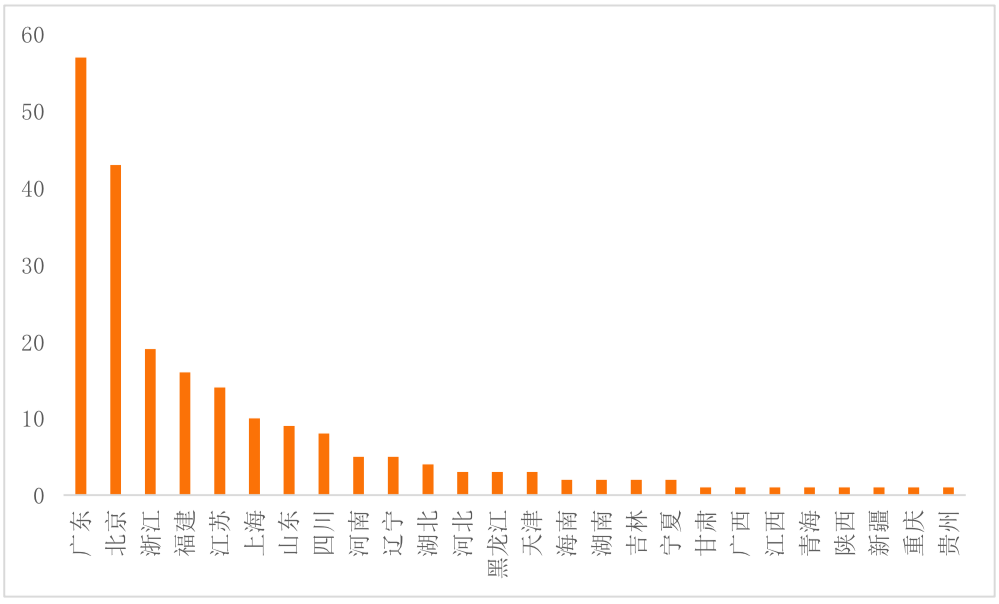
Data source: Oriental Fortune choice, Wind, Zero One Think Tank
In terms of specific cities, blockchain concept stocks are most widely distributed in Beijing, Shenzhen, Hangzhou, Shanghai, and Guangzhou. Among them, the number of concept stocks in Beijing and Shenzhen is 43 and 40, respectively. 13), Shanghai (10), and Guangzhou (8) have larger distances.
Figure 3: Geographical distribution of 215 blockchain concept stocks
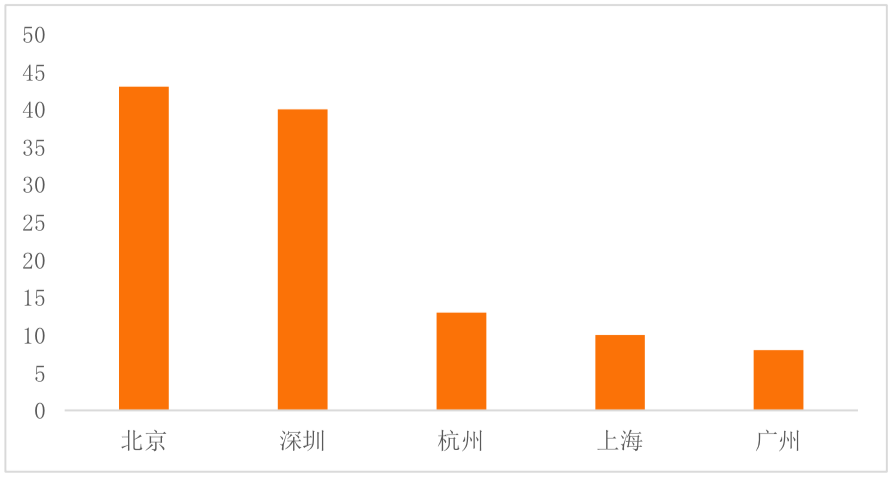
Data source: Oriental Fortune choice, Wind, Zero One Think Tank
Taken together, the activeness of listed companies in different regions in the blockchain field is closely related to local policies on the blockchain industry.
The State Council mentioned blockchain for the first time in the "Thirteenth Five-Year Plan" National Information Plan released in December 2016, emphasizing that it is one of the key cutting-edge technologies and needs to strengthen its innovation, testing, and applications. In June 2017, the "13th Five-Year Plan" for China's financial industry's information technology development plan issued by the central bank also clearly proposed to actively promote the application of new technologies such as blockchain and artificial intelligence, and at the same time organize the trial of national digital currencies.
Since then, the Ministry of Industry and Information Technology, the Ministry of Finance, the Ministry of Commerce and other departments have successively introduced relevant policies related to supporting the blockchain, and local governments have also actively responded by introducing preferential policies to support the development of the blockchain industry. Beijing, Shanghai, Guangzhou, Shenzhen and Hangzhou are the "first echelon" cities of the blockchain, and the corresponding blockchain industry support and supervision policies are also in place.
In addition, from the perspective of market atmosphere and industrial structure, first-tier cities are high-tech industrial clusters and are most sensitive to high-tech such as blockchain. They are more likely to develop R & D applications on such technologies. At the same time, the advantages of first-tier cities in terms of talents and funds are also more conducive to promoting the application of blockchain technology.
(2) Most companies in the computer and media fields are involved in the physical application scenarios
From the perspective of industry distribution, the industries to which the concept shares belong are mainly computer (84), media (33), electronics (12), and communications (11).
Figure 4: Industry distribution of 215 concept stock boards

Data source: Oriental Fortune choice, Wind, Zero One Think Tank
Note: The industry classification refers to the Shenwan Tier 1 enterprise standard.
Companies in the computer field include companies such as Hang Seng Electronics, Flush, Aerospace Information, Inspur Information, NavInfo, etc.
Hang Seng Electronics is a leading domestic financial IT service company. According to the data, Hang Seng Electronics has obtained 9 patents in blockchain related fields, and the Hang Seng Shared Ledger HSL has been included in the network information office's blockchain information service filing system.
Flushing is a leading Internet financial information service provider in China. Its main business is to provide software products and system maintenance services, financial data services, etc. to various types of institutional customers at home and abroad. In July 2019, Flush stated on the interactive platform that certain blockchain-related technologies have been reserved, and actively explored the application of blockchain-related technologies in the field of Internet financial information services.
At present, the development of China's blockchain industry has initially formed a complete system. According to the project, the subdivided areas can be divided into the following seven main categories, including: basic technology facilities & technology solutions, digital asset related, financial application scenarios, and physical application scenarios , Other on-chain applications, industry services and others.
Figure 5: Proportion of concept stocks in the seven business categories
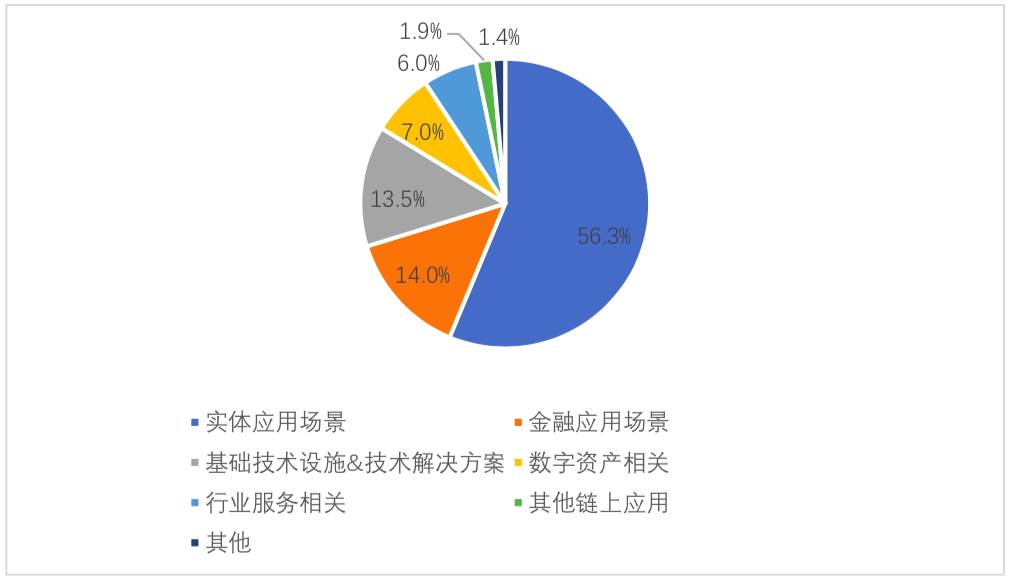
Data source: Oriental Fortune choice, Wind, Zero One Think Tank
From the perspective of the blockchain business mainly involved in concept stocks, the number of enterprises in the physical application scenario category is the largest, accounting for 56.3%, and involves specific applications such as traceability, certificate storage, e-government, Internet of Things, supply chain, and digital marketing. The second is the financial application scenario, accounting for 14.0%, involving supply chain finance, credit reporting, insurance, and points. And infrastructure technology & technology solutions, accounting for 13.5%.
Development of Blockchain Business in Concept Stocks
From the perspective of specific business development, not every company with 215 blockchain concept stocks actually develops blockchain business. Many companies are associated with the blockchain through investment or equity participation. Not involved in the blockchain business. At the same time, the degree of advancement varies among companies that have already developed blockchain business.
(I) Nearly 30 companies have not actually launched blockchain business
According to the incomplete statistics of Zero One Finance, as of November 15, at least 20 companies out of 215 concept stocks have demonstrated through the investor exchange platform or other public channels that the companies are not currently conducting actual blockchain business, and at least 6 The company indicates that it is carrying out related R & D or has related reserves.
Table 1: Concept stocks that have not actually launched a blockchain business

Source: Internet public information, Zero One Think Tank
Table 2: Concept stocks that have been researched on blockchain

Source: Internet public information, Zero One Think Tank
(II) At least 30 companies are associated with the blockchain through investment, equity participation, etc.
Among the 215 concept stocks, at least 30 companies are associated with the blockchain concept by investing in, holding stocks, participating in shares or setting up subsidiaries to conduct blockchain business. Among them, Xinhu Zhongbao, Zheda Wangxin, and 3D Communication are all concept stocks related to the fun chain of blockchain enterprises. Baosteel Co., Ltd., Xinhuanet.com, 236, and the venture-backed black horse companies have related products or services to obtain blockchain information services for the record.
Table 3: Equity related information of concept stocks and blockchain companies


Source: Enterprise search, Internet public information, Zero One think tank. As of November 28
Third, the related listed companies from the blockchain record information
In the concept stocks that actually carry out the blockchain business, the degree of progress of the business is also uneven. In order to better show the development of the blockchain business of listed companies, this report uses the two batches of filing information of the Internet letter office cloth as a reference. , And selected 42 affiliated listed companies (including 11 Hong Kong and US listed companies) for further analysis of their blockchain business.
(I) 42 listed companies: China Ping An's related blockchain record information reaches 10
Since 2019, the Cyberspace Office has released two batches of 506 blockchain information service filing numbers before and after, involving 414 companies and 42 associated listed companies (the blockchain service belongs to the company itself or its subsidiaries, Sun (Owned by companies, joint stock companies).
Among them, there are 31 A-share listed companies, including 21 on the Shenzhen Stock Exchange and 10 on the Shanghai Stock Exchange. In addition, there are 5 listed companies in Hong Kong, namely ZhongAn Online (06060.HK), Tencent Holdings (00700.HK), Drow Smart (02098.HK), Kingdee Software (00268.HK), Kingsoft (03888.HK) ); 6 stocks listed in the US listed blockchain, including: Baidu (BIDU.O), Jingdong (JD.O), iQiyi (IQ.O), Alibaba (BABA.N), Xunlei (XNET .O), good future (TAL.N).
Table 4: Blockchain filing information associated with 42 listed companies
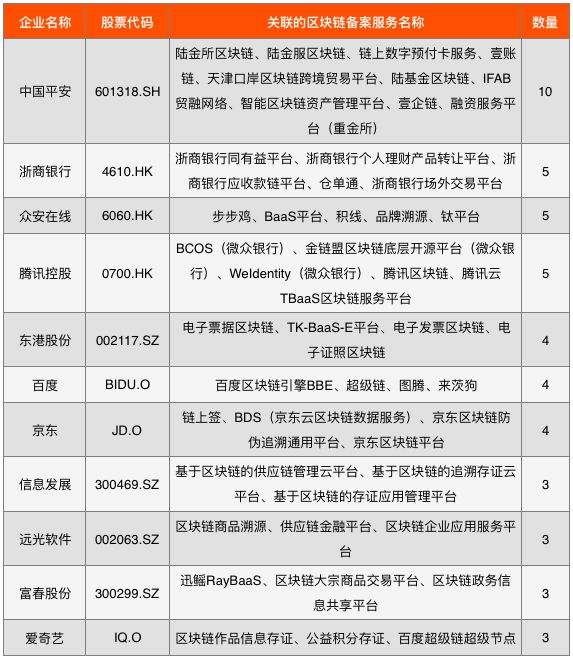
Data source: Cybertrust Office, Zero One Think Tank
As shown in the table above, the three traditional Internet giants of Ali, Tencent and Baidu and the two e-commerce giants of JD.com and Suning Tesco have corresponding blockchain information service filings.
In terms of financial institutions, there are four banks, such as Industrial and Commercial Bank of China, Ping An Bank, Zheshang Bank and Bank of Jiangsu, as well as Ping An and Zhongan Online.
In addition, enterprise service software provider Kingdee International, a good future in the field of education, Midea Group in the field of home appliances, and courier are also leading SF Holdings, and BGI in the field of medicine and biology are on the list of blockchain information services.
Among the blockchain service record information related to 42 listed companies, traceability, certificate deposit, electronic bills, supply chain, finance, public chain, alliance chain, etc. are the application scenarios with high frequency. Among them, China's Ping An Association has the most filing services. The 10 pieces of filing information include: Lufax Blockchain, On-chain Digital Prepaid Card Service, One Account Chain, Tianjin Port Blockchain Cross-Border Trading Platform, Lu Fund Blockchain, IFAB Trade financial network, intelligent blockchain asset management platform, one enterprise chain, financing service platform, including its financial one account, Lujin, one wallet and so on.
(II) Seeing the development path and promoting results of the blockchain from the case
In the development and application of emerging technologies, Internet giants are always at the front end, and the blockchain business of giants such as BATJ is also the reference focus of other domestic companies. In addition, the financial industry is considered to be the most suitable application scenario for blockchain technology, and financial institutions' application of blockchain technology has also attracted much attention. In this section, Tencent, one of the Internet giants, and Zheshang Bank and ZhongAn Online, which are known as the "first block chain banks", will be taken as examples to show the progress and development status of the blockchain business of listed companies.
1. Internet giants: Tencent Holdings (0700.HK)
Among the three traditional Internet giants, Tencent and Ali were the first to deploy blockchain. Tencent established a blockchain research and development team at the end of 2015.The development of its blockchain business has evolved from early technology research and development to the construction of the Baas platform, opening it up to a large number of business scenarios in 2017 and 2018, and at the same time, it continues to promote ecology Cooperation is established.
In 2015, Tencent became the first group of companies to pass the trusted blockchain evaluation. In 2016, Tencent's advancement in the blockchain field mainly focused on Weizhong Bank. In that year, Weizhong Bank initiated the establishment of the Financial Blockchain Cooperation Alliance (Golden Chain Alliance), and also launched the Tencent Cloud-based Alliance Chain Cloud. Services (BaaS) and cross-agency alliance chains. Later, in 2017 and 2018, large-scale applications landed. Specific application scenarios include finance, logistics, taxation, supply chain finance, medical care, gaming, smart travel, smart tourism, etc., and the business covers B-side and C-side customers.
Table 5: Tencent blockchain business development
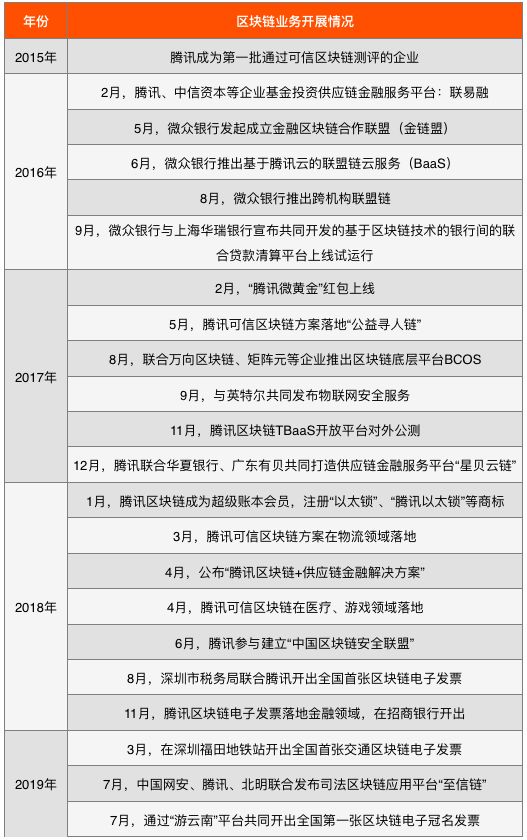
Source: Incomplete statistics based on publicly available information on the Internet, Zero One Think Tank
At present, Tencent's blockchain product record information includes 5 items: BCOS (Weizhong Bank), Golden Link Alliance's underlying open source platform (Weizhong Bank), WeIdentity (Weizhong Bank), Tencent Blockchain, Tencent Cloud TBaaS blockchain service platform.
Among them, BCOS is an enterprise-level alliance chain underlying platform jointly developed by Weizhong Bank, Wanxiang Blockchain, and Matrix Element. The platform was fully open-sourced in July 2017. In December 2017, Golden Chain Alliance, where Weizhong Bank is located, launched a financial branch version of BCOS-FISCO BCOS. This platform was developed and maintained by members of Golden Chain Alliance platforms such as Huawei, Shenzhen Stock Connect, Tencent, Weizhong Bank, and Sifang Jingchuang Relevant cases include: Weizhong Bank's inter-agency reconciliation platform, chain real estate registration system, arbitration chain, Sifang Jingchuang supply chain finance, etc.
2. Internet insurance: ZhongAn Online (6060.HK)
ZhongAn Online (full name "ZhongAn Online Property Insurance Co., Ltd.") is the first Internet insurance company in China. Its shareholders include Ant Financial, Tencent, and Ping An of China. It was approved by the Banking Regulatory Commission to open in 2013. September 2017 Listed on the Hong Kong Stock Exchange. In the development process, ZhongAn Online even more emphasized the use of science and technology to reshape the insurance value chain. In terms of the development and application of blockchain technology, Zhongan Online has established a blockchain team since 2105. According to information, the team has submitted a total of 129 blockchain-related patents so far, and 112 can be checked through public examination.
In November 2016, Zhongan Online established a subsidiary, Zhongan Technology, which will conduct business development and layout in the blockchain field. While using blockchain technology to improve the operating efficiency and quality of its insurance business, it will also Output blockchain solutions to empower the industry.
In October 2018, ZhongAn Technology launched an insurance product-based blockchain asset protocol, the Policy Backed Token (PBT), to achieve the tokenization of insurance assets. The application scenario of the insurance token is mainly used in the reimbursement of medicines, which can be realized without advances, and reimbursement at the same time.
In terms of external output, ZhongAn Online has launched industry solutions such as electronic contracting, digital identity, distributed encrypted storage, anti-counterfeiting traceability, certificate storage, and supply chain finance based on its Anlian Cloud platform.
At present, Zhongan's blockchain solutions have covered more than ten fields such as traceability, public welfare, government affairs, medical treatment, copyright, supply chain finance, insurance, credits, and private data. Its main blockchain products include Zhongan Chain ( Annchain), titanium empty cabin (distributed privacy and secure storage), titanium certificate of deposit (electronic data security), and titanium sun, etc.
In the filing of the blockchain information service, there are 5 items of record information associated with ZhongAn Online, including: Step by step chicken, BaaS platform, Jiji, brand traceability, titanium platform.
Among them, the BaaS platform is a product launched to reduce the threshold for enterprises to use the blockchain. It can realize sub-module design and visual operation. Jiji is a point issuance system for point marketing and point system construction. The brand traceability platform provides Based on the blockchain's traceability and certificate storage function, the product information can be chained and anti-counterfeiting queries can be implemented. In the field of traceability, Zhongan has precipitated technologies such as diamond traceability and food safety traceability. The titanium platform includes titanium contracts, titanium certificate deposit services, Users provide a series of cloud services such as electronic contract signing, certificate deposit, verification, and certificate issuance.
3. Department of Banking: Zhejiang Commercial Bank (601916.SH; 02016.HK)
Among domestic commercial banks, Zheshang Bank is a pioneer in promoting blockchain applications. Established in 2004, Zheshang Bank is a national joint-stock commercial bank headquartered in Zhejiang and listed on the Hong Kong stock market in 2016. On November 26, 2019, Zheshang Bank was listed on the Shanghai Stock Exchange, becoming the 35th listed bank of A shares and the 13th "A + H" listed bank.
Zheshang Bank is the first bank in the industry to apply blockchain technology to its core business. In 2016, it launched a blockchain-based mobile digital money order platform. In 2017, Zheshang Bank launched “blockchain + supply chain finance” products such as receivables chain platform and warehouse receipts, and successively built “Caiyiyun” personal financial transaction platform and interbank asset transaction platform. Currently, Judging from the above, Zheshang Bank's application of blockchain technology has covered its corporate business, retail business and financial market business.
Afterwards, Zheshang Bank began to explore the asset securitization of blockchain receivables. In August 2018, it successfully issued the "Zheshang Chainrong 2018 Phase I Enterprise Receivables Asset-Backed Notes." Data show that as of now, Zheshang Bank has issued a total of 12 issues of corporate receivable asset-backed notes (ABN) for a total of 5.985 billion yuan, serving hundreds of physical enterprises.
The prospectus shows that the key application of Zheshang Bank in the application of the blockchain is the receivables chain platform, which is specifically used for the issuance, acceptance, confirmation, payment, transfer, pledge, redemption of corporate receivables, etc. business. As of June 30, 2019, Zheshang Bank had landed 1,848 receivables chain platforms, and the confirmed balance of blockchain receivables chain was 72.270 billion yuan.
At present, Zheshang Bank has five blockchain service platforms, such as the receivables chain platform, warehouse receipts platform, personal wealth management transfer platform, and Tongxin platform, which have entered the domestic blockchain information service record numbers issued by the State Network Information Office.
End.
We will continue to update Blocking; if you have any questions or suggestions, please contact us!
Was this article helpful?
93 out of 132 found this helpful
Related articles
- Brand value on the chain, Nike blockchain anti-counterfeiting patents can still play like this?
- New York Department of Financial Services (NYDFS) plans to update BitLicense terms for the first time in 5 years, currency exemption list + listing template
- AI analyzes 17-bit encrypted Big V personality: Vitalik is the most intelligent, and BM has strong self-confidence
- Leader of Tencent blockchain technology: Excellent blockchain application scenarios need to meet three dimensions
- Filecoin launches testnet today, mainnet will be online from March to April 2020
- Recruitment of blockchain talents returns to rationality: both the number of miners and the salary of mining-type companies have fallen
- Babbitt Original | Return to the Securities and Futures Commission 22 years later, why did Yao Qian ’s “return” attract much attention?






